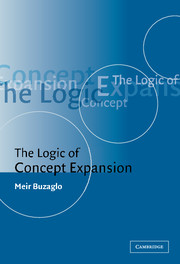Book contents
- Frontmatter
- Contents
- Preface
- Acknowledgments
- Introduction
- 1 Historical background
- 2 Frege's opposition
- 3 The grammar of constraints
- 4 Expansions as rational procedures
- 5 Implications for concepts
- 6 From words to objects
- 7 Gödel's argument
- 8 Implications for thoughts
- 9 “I was led astray by language”
- Epilogue: How do we go on from here?
- References
- Index
4 - Expansions as rational procedures
Published online by Cambridge University Press: 22 September 2009
- Frontmatter
- Contents
- Preface
- Acknowledgments
- Introduction
- 1 Historical background
- 2 Frege's opposition
- 3 The grammar of constraints
- 4 Expansions as rational procedures
- 5 Implications for concepts
- 6 From words to objects
- 7 Gödel's argument
- 8 Implications for thoughts
- 9 “I was led astray by language”
- Epilogue: How do we go on from here?
- References
- Index
Summary
In this chapter I will try to advance the ideas presented in the previous chapter. First I will investigate the connection between forced expansions and logical deductions, discuss the general applicability of forced expansions, and analyze their relation to the rule-governed completion of sequences or matrices. This will support what I asserted in the previous chapter – that not only can forced expansions be described formally, but they are a special kind of rational, logical procedure. In other words, I propose not only that we can write a formalism of non-arbitrary expansions but that such expansions are immanently linked to logic. I complete the chapter with a section on the source of the productivity of forced expansions, which will help us judge which of several possible expansions is the most promising one.
THREE CHARACTERISTICS
The claim that forced expansions are rational, logical procedures seems to require a discussion of the nature of rationality and logic. For that purpose, however, it would be necessary to take a stand on controversial issues that would take us far away from the limited topic of the present book. Instead, I have chosen to list three characteristics of forced expansions that are uncontroversially accepted as characteristics of rational procedures. If anyone prefers to keep the term “logic” for something narrower, I am willing to concede that forced expansions do not constitute a logical procedure par excellence, but only something resembling such a procedure.
- Type
- Chapter
- Information
- The Logic of Concept Expansion , pp. 54 - 71Publisher: Cambridge University PressPrint publication year: 2001



